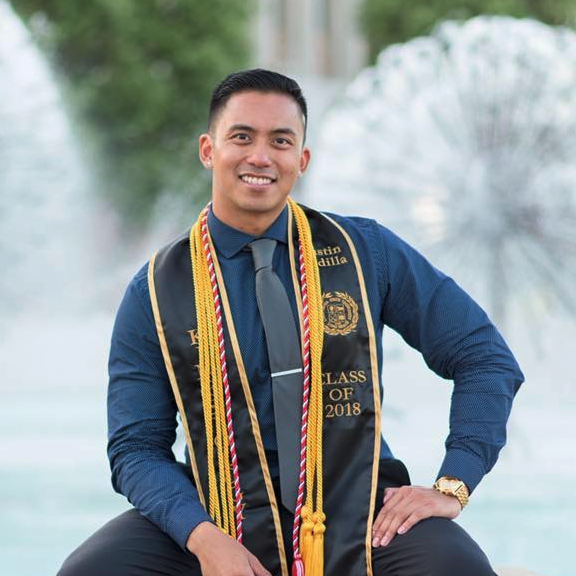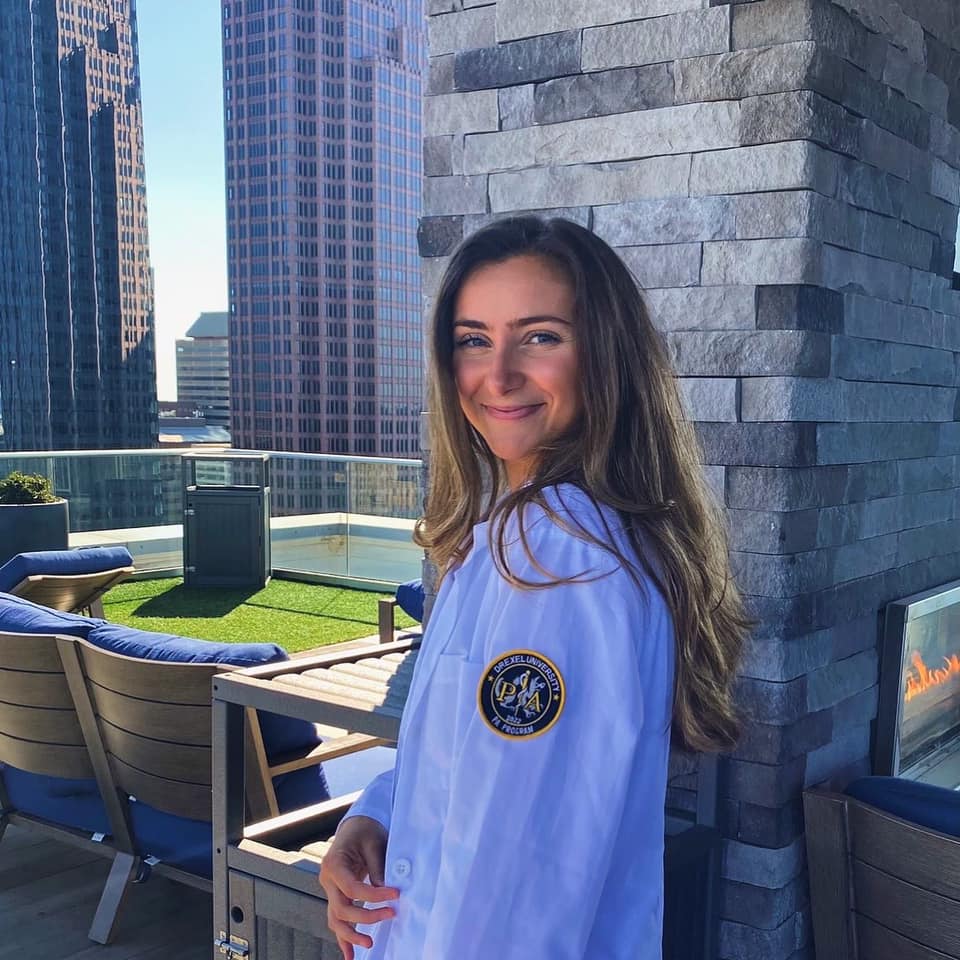Get to Know Our PA Students
April 26, 2022
**In the Spring 2022 Physician Assistant Department Newsletter, Justin Judilla's name was misspelled. We sincerely apologize to Justin, but hope that the PA students, alumni, faculty, staff and friends enjoy reading about Justin's path to becoming a Physician Assistant.
Justin Judilla
 Why did you choose the PA profession?
Why did you choose the PA profession?
Although I was always interested in medicine growing up, I wasn’t sure which path to pursue. I was originally a kinesiology major in undergrad, but I had an awesome experience with a PA at an urgent care center. As a result of her professionalism and care, I became interested in the profession and joined the Pre-PA club at my school, attended conferences, did some research and talked to multiple people about what PAs are and what their role is in health care.
It is because of their emphasis on establishing strong patient-provider relationships and their dedication to teamwork that I chose the PA profession. During my time as a medical assistant, I enjoyed educating and treating patients while building a steady rapport. To better serve my community, I decided to become a PA so I could enhance my knowledge and clinical skills. I hope to make a difference in the future as a health care provider and eventually be able to teach other students as a preceptor.
Why did you choose the Drexel University PA program?
I chose Drexel because of its involvement in health and wellness initiatives, community service and diversity and inclusion policies. Drexel also has an excellent reputation across the nation as a top PA program. Since I'm from San Diego, I wanted to know how health care and the population in the city differed. Initially, it seemed like a long shot to apply, but I'm glad I took the chance!
Is there a faculty member who has been influential in your academic career?
Each faculty member is so diverse in their knowledge of medicine and their approach to teaching that every interaction I have had has been beneficial. Professors Madden and Ercole really helped me out both during class and after when I needed advice. Their willingness to sit down with me during some difficult days was greatly appreciated.
Is there a particular class that you think has helped you determine your future professional plans or area you wish to practice in?
I really enjoyed my Clinical Reasoning Lab during winter quarter because of how everything started to come together: from learning how to speak with patients, to writing SOAP notes, to completing patient education projects. By being able to connect topics we’ve learned from lectures, everything started to make more sense. As of right now, I don’t know what specialty or area I want to practice in, but I do hope to work with LGBTQIA youth in the future.
How can PA professionals improve health equity?
The role of PAs in providing health care and filling in gaps within communities is essential. They are vital in several clinical settings, especially in underserved communities, as they can evaluate, treat and do everything in between. In addition to clinical training, PAs are taught how to communicate and work with patients from different backgrounds while remaining objective and unbiased. Because PAs focus on gaining a thorough history and developing communication skills that help establish patient-provider relationships, they listen to the patient and strive to make sure they are treated as a whole. PAs work with other health care professionals to provide high-quality care to patients from all walks of life.
Are you involved with Drexel student organizations or campus activities?
I have the privilege of representing my cohort as the W.W. Oaks Physician Assistant Student Association President of the class of 2023 at Drexel. I am also involved in organizations such as the Physician Assistant Minority Alliance (PAMA) and the LGBTQIA Plus interest groups. Even though PA school can be time-consuming, I try to be involved in activities held at the University City campus.
Do you have a favorite restaurant, museum or location in Philadelphia you enjoy spending time?
The food trucks, especially the Halal carts outside Haggerty and the Drexel Rec center, have been the MVPs when it comes to my weekend motivation to study. A few other locations such as The Barnes Foundation, Philadelphia Museum of Art and the state penitentiary have all been cool places to visit as well. I've been making my way around the city whenever I have time, and there is so much more to see and do!
Is there anything you wish you had known before you started this program, i.e., do you have any advice for prospective students?
My best advice would be to not be too hard on yourself. As with many other graduate programs, PA school will be challenging, but not impossible. Going into school, remember to give yourself breaks and to try and not feel ashamed for taking them. PA school is a marathon and not a sprint, you don’t want to burn yourself out too quickly. And don’t forget to ask for help from your instructors, your advisors and your peers. Everyone wants to see you succeed. You got this!
Amanda Rogers
 Why did you choose the PA profession?
Why did you choose the PA profession?
I have always known that I wanted to go into medicine. However, I chose the PA profession specifically due to the flexibility that it offers and its emphasis on patient care. I love that I can switch it up over the course of my career and continue my journey as a lifelong learner. I also feel like PAs have a special way with patients that I have always admired. I am so proud of this profession and how far it has come. I am so excited to graduate and officially become a PA!
Why did you choose the Drexel University PA program?
I chose to come to Drexel for the caring and highly qualified faculty of the PA program. The PA program is one of the oldest and most highly regarded in the nation for good reason. Because the program started around the same time as the PA profession began, it is grounded in the original purpose of the physician assistant career – improving access to quality primary care for all patients. Throughout my education, this theme has rung true. We are thoroughly trained to be well-rounded, empathetic, culturally sensitive providers who will advocate for the profession for years to come regardless of where our careers take us. Instead of spending five weeks in assorted specialties after we complete the core six clinical rotations, we spend two 10-week long periods of time diving into primary care and family medicine. I know that I am going to graduate with the knowledge necessary to provide meaningful care to patients who need it most.
Is there a faculty member who has been influential in your academic career?
Drexel’s faculty genuinely care about the students’ well-being. It is hard to select just one faculty member who has been influential in my academic career. A professor that comes to mind is Dr. Ellen Feld. Dr. Feld projects a kind, calm and compassionate demeanor, which means so much to stressed PA students. She is an excellent role model and teacher. My academic career has also been influenced by my graduate project advisor, Courtney Ercole. Courtney has been such a light throughout the development of my project. I admire her passion for social issues and excitement for teaching.
Is there a particular class that you think has helped you determine your future professional plans or area you wish to practice in?
The class that I believe shaped my future professional plans is Topics in Clinical Practice, which is taken during the summer quarter right before clinical year. This class truly ties together medicine that is learned throughout the previous three quarters. We spent several weeks on emergency medicine/acute care. During this time, I realized this is a major interest of mine. This excitement was confirmed during my ED rotation in my clinical year.
How can PA professionals improve health equity?
The PA profession was founded to fill gaps in health care and address health inequity, which exist due to biopsychosocial barriers to care. PAs expands the reach of health care and serve as a solution to the shortage of practitioners that exists in underserved communities. PAs are trained as generalists and can therefore work in any specialty where they are needed. Additionally, PAs are trained in patient-centered care, which emphasizes patient education and shared decision-making. Strong, trusting relationships between patients and providers is at the root of making an impact and improving health equity.
Are you involved with Drexel student organizations or campus activities?
I am the Community Outreach Chair of the W.W. Oaks Student Society, which is the PA Program’s student organization. As chair, I coordinate community service opportunities and events for classmates. I also love to volunteer in the community!
Do you have a favorite restaurant, museum or location in Philadelphia you enjoy spending time?
My favorite place in Philadelphia is the dog park at the Schuylkill River Park. One of my favorite activities is walking around the Rittenhouse Square neighborhood and then going to the dog park. I also have really enjoyed visiting the Barnes Foundation and the Philadelphia Museum of Art.
Is there anything you wish you had known before you started this program, i.e.… do you have any advice for prospective students?
Keep the big picture in mind! It is easy to assume that a perceived fault in your application or coursework is the end of the world. However, it is you, not your application, resume or GPA, that is going to be a great provider one day! When you get worked up about a small detail, try to remind yourself to take a step back and see the whole, instead of focusing on a tiny part.